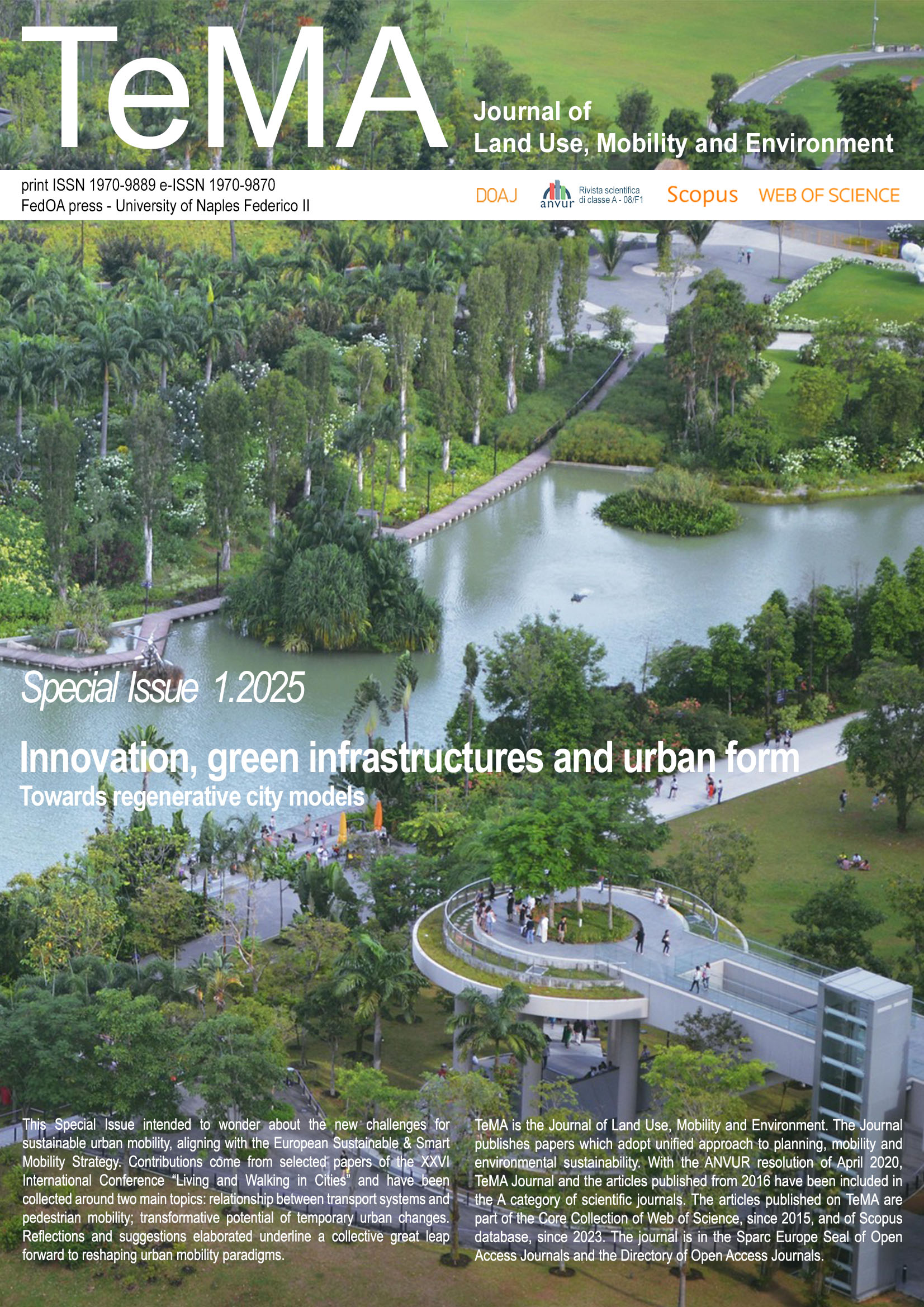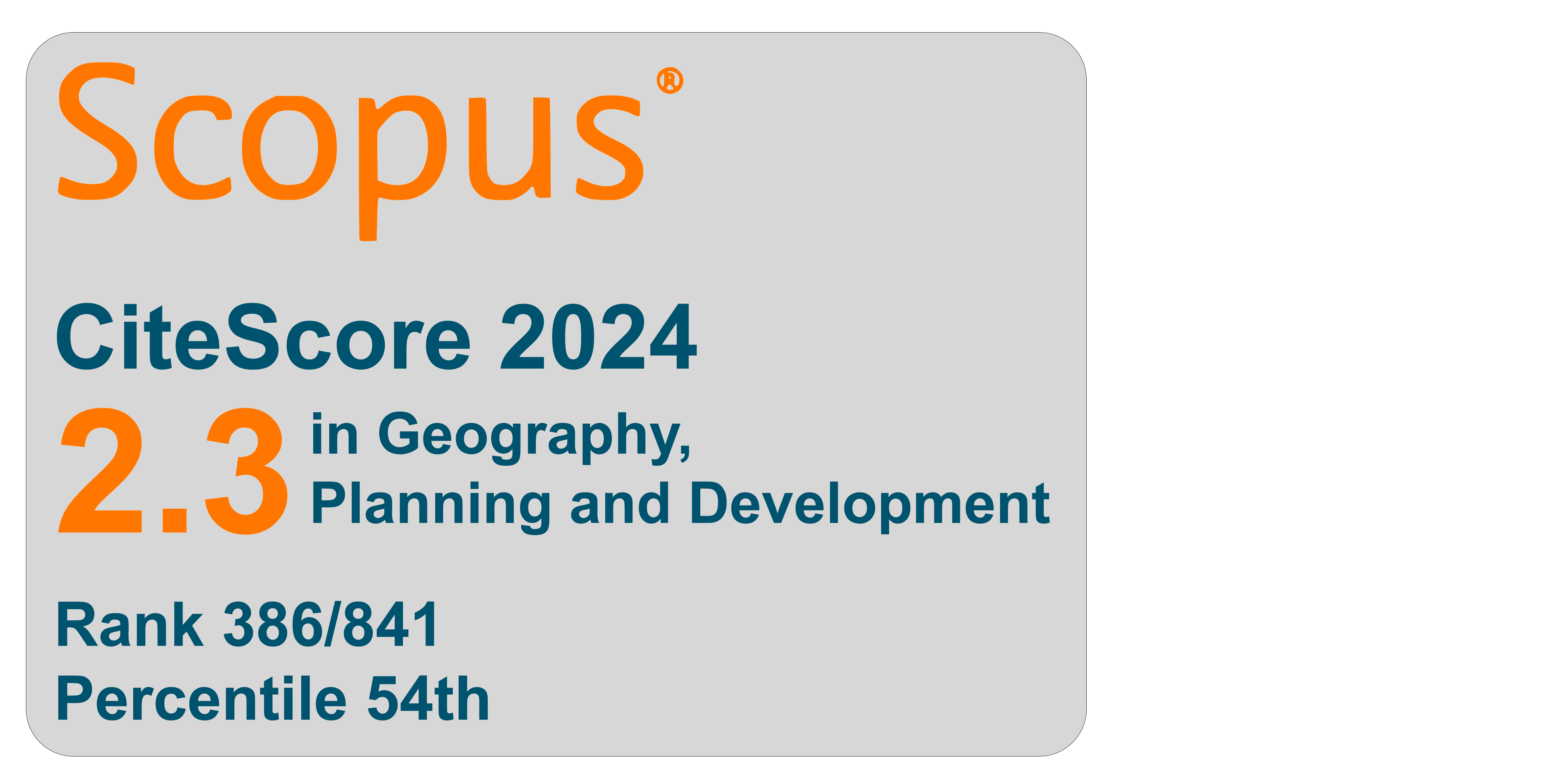Civic Seoul 2030: toward infrastructural renaturalization
DOI:
https://doi.org/10.6093/1970-9870/11176Keywords:
Urban Regions, Green Networks, Territorial InnovationAbstract
Citizens play a crucial role in shaping cities, balancing rights and responsibilities in public and private spaces. The concept of civic ethics involves finding a common identity within diverse individual differences and promoting sustainable urban ecosystems. Despite economic growth and formal democracy, residents of Seoul may not yet fully embrace this civic identity. Civic ethics call for a more integrated approach to city living, emphasizing values such as autonomy, empathy, diversity, and ecological awareness.
Seoul's future development will be influenced by global trends in urbanization, requiring the city to adapt and plan strategically. The Metropolitan Government of Seoul is focused on inclusive growth, developing new engines for growth, and responding to changing demographics, but simultaneously on a process of decarbonization and renaturalization. To create a vision for 'Future Seoul,' the city is analyzing successful urban strategies from around the world and considering innovative approaches like a 'Civic City Seoul' model. In the light of a series of preliminary research, a number of architects are invited for our ‘Underground’ and ‘Superground’ projects. These projects reexamine various urban systems which used to be regarded as monofunctional and with a strong characterization related to urban renaturalization processes.
Downloads
References
Ahern, J. (2013). Urban landscape sustainability and resilience: The promise and challenges of integrating ecology with urban planning and design. Landscape Ecology, 28(6) 1203-1212. https://doi.org/10.1007/s10980-012-9799-z
Artmann, M. Kohler, M. Meinel, G. Gan, J. & Ioja, I. C. (2017). How smart growth and green infrastructure can mutually support each other — A conceptual framework for compact and green cities. Ecological Indicators, 96, 10-22. https://doi.org/10.1016/j.ecolind.2017.07.001
Bocca, A. (2021). Public space and 15-minute city. TeMA - Journal of Land Use, Mobility and Environment, 14(3), 395-410. https://doi.org/10.6093/1970-9870/8062
Pirselimoğlu Batman, Z., Ender Altay, E. & Şengül, S. (2024). The relationship between walkability and landscape values in transportation. Examination of landscape values in urban area transportation axes. TeMA - Journal of Land Use, Mobility and Environment, 17 (2), 285-308. http://dx.doi.org/10.6093/1970-9870/10462
Raymond, C., Frantzeskaki, N., Kabisch, N., Berry, P., Breil, M., Razvan Nita, M., Geneletti, D. & Calfapietra, C. (2017). A framework for assessing and implementing the co-benefits of nature-based solutions in urban areas. Environmental Science & Policy, 77, 15-24. https://doi.org/10.1016/j.envsci.2017.07.008
Buijs, A. E. Mattijssen, T. J. Van der Jagt, A. P. Ambrose-Oji, B. Andersson, E. Elands, B. H. & Steen Møller, M. (2016). Active citizenship for urban green infrastructure: Fostering the diversity and dynamics of citizen contributions through mosaic governance. Current Opinion in Environmental Sustainability, 22, 1-6. https://doi.org/10.1016/j.ufug.2018.06.011
Canessa, N.V. (2021). UNnatural. New York-Barcelona: Actar
Cialdea, D. (2023). The role of peri-urban agriculture in the pandemic era. TeMA - Journal of Land Use, Mobility and Environment, 16(2), 307-329. https://doi.org/10.6093/1970-9870/10209
Gausa M. & Joon K. (2020) Superground / Underground. Seoul New Groundscapes. New York-Barcelona: Actar
Gaglione, F. (2023), Policies and practices of transition towards climate-neutral and smart cities. TeMA - Journal of Land Use, Mobility and Environment, 16(1), 227-231. https://doi.org/10.6093/1970-9870/9822
Haase, D., Kabisch, S., Haase, A., Andersson, E., Banzhaf, E., Baró, F., Brenck, M., Fischer, L., Frantzeskaki, N., Kabisch, N., Krellenberg, K., Kremer, P., Kronenberg, J., Larondelle, N., Mathey, J., Pauleit, S., Ring, I., Rink, D., Schwarz, N. & Wolff, M. (2017). Greening cities – To be socially inclusive? About the alleged paradox of society and ecology in cities. Habitat International, 64, 41-48. https://doi.org/10.1016/j.habitatint.2017.04.005
Hae-Won S., Gausa M. & Canessa N.V. (2018). I.Seoul.U: Basic Survey for the Urban Visions of Civic City Seoul. Seoul: Seoul Development Institute.
Kabisch, N., Frantzeskaki, N., Pauleit, S., Naumann, S., Davis, M., Artmann, M., Haase, D., Knapp, S., Korn, H., Stadler, J., Zaunberger, K. & Bonn, A. (2016). Nature-based solutions to climate change mitigation and adaptation in urban areas: perspectives on indicators, knowledge gaps, barriers, and opportunities for action. Ecology and Society, 21 (2). http://www.jstor.org/stable/26270403
Palermo, A., Chieffallo, L. & Virgilio, S. (2024). Re-generate resilience to deal with climate change. TeMA - Journal of Land Use, Mobility and Environment, (1), 11-28. https://doi.org/10.6093/1970-9870/9969
Papa, R., Battarra, R., Fistola, R. & GargiuloC. (2021). The city as a complex system in structural crisis. TeMA - Journal of Land Use, Mobility and Environment, 14(3), 455-491. https://doi.org/10.6093/1970-9870/8696
Pincetl S. (2017). Cities in the age of the Anthropocene: Climate change agents and the potential for mitigation. Anthropocene, 20, 74-82. https://doi.org/10.1016/j.ancene.2017.08.001
Pultrone, G., (2024). Transform Active facing the ecological transition. TeMA - Journal of Land Use, Mobility and Environment, Special Issue, 79-96. https://doi.org/10.6093/1970-9870/10210
Shirgir, E., Kheyroddin, R. & BehzadfarM. (2019). Defining urban green infrastructure role in analysis of climate resiliency in cities based on landscape ecology theories. TeMA - Journal of Land Use, Mobility and Environment, 12 (3), 227-247. https://doi.org/10.6092/1970-9870/6250
Weil, C., Bibri, S., Longchamp, R., Golay, F., Alahi, A. (2023) Urban Digital Twin Challenges: A Systematic Review and Perspectives for Sustainable Smart Cities. Sustainable Cities and Society, 99. https://doi.org/10.1016/j.scs.2023.104862
Zölch, T., Henze, L., Keilholz, P. & Pauleit, S. (2017). Regulating urban surface runoff through nature-based solutions – An assessment at the micro-scale. Environmental Research, 157, 135-144. https://doi.org/10.1016/j.envres.2017.05.023
Downloads
Published
How to Cite
Issue
Section
License
Copyright (c) 2025 TeMA - Journal of Land Use, Mobility and Environment

This work is licensed under a Creative Commons Attribution-NonCommercial 4.0 International License.



